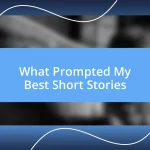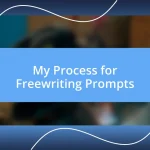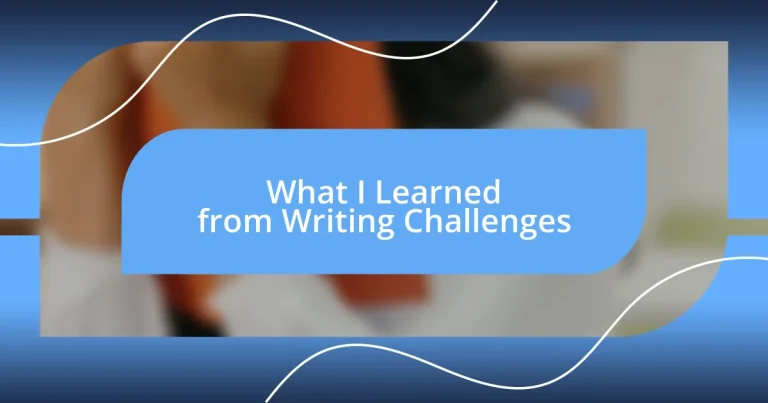Key takeaways:
- Writing challenges foster creativity, resilience, and personal growth, transforming struggles into valuable learning experiences.
- Different types of writing challenges, such as word count, prompt-based, and collaborative challenges, enhance creativity and community support.
- Establishing a writing routine and embracing feedback nurtures growth and connection among writers, reinforcing the importance of setting clear goals and celebrating progress.
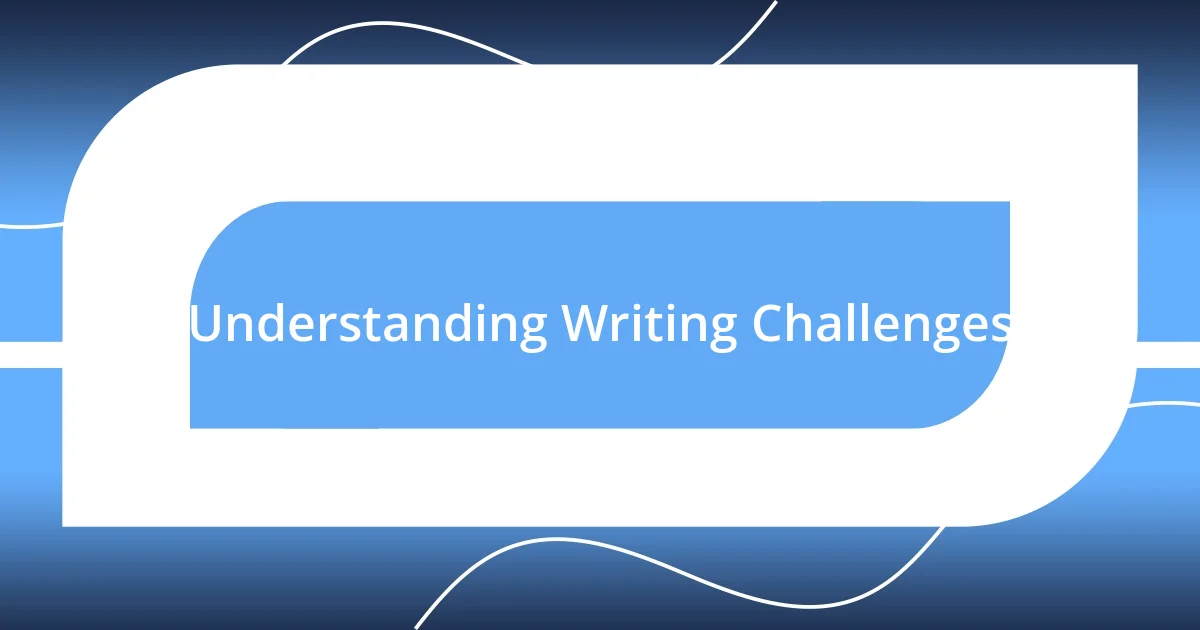
Understanding Writing Challenges
Writing challenges can feel like daunting hurdles to leap over, but I’ve found they’re often rich ground for growth. When I first faced a time constraint during a 30-day writing challenge, I was flooded with anxiety. How could I produce something meaningful every day? Yet, that pressure pushed me to think creatively and write without overthinking, revealing my true voice.
One thing I’ve learned is that these challenges test not just our skills but also our persistence and resilience. I vividly remember pushing through a block when I just didn’t feel inspired one evening. Instead of giving in, I decided to write about my struggle itself, which turned out to be one of the most authentic pieces I’ve ever created. Have you ever felt that surge of creativity born from frustration? It’s exhilarating, isn’t it?
Ultimately, understanding writing challenges involves recognizing how they can reshape our approach to the writing process. These experiences have taught me that vulnerability often leads to discovery. The more we lean into our struggles and embrace discomfort, the richer our writing becomes. How do you view the challenges in your writing journey? I’ve come to see them as opportunities for transformation and deeper connection with my craft.
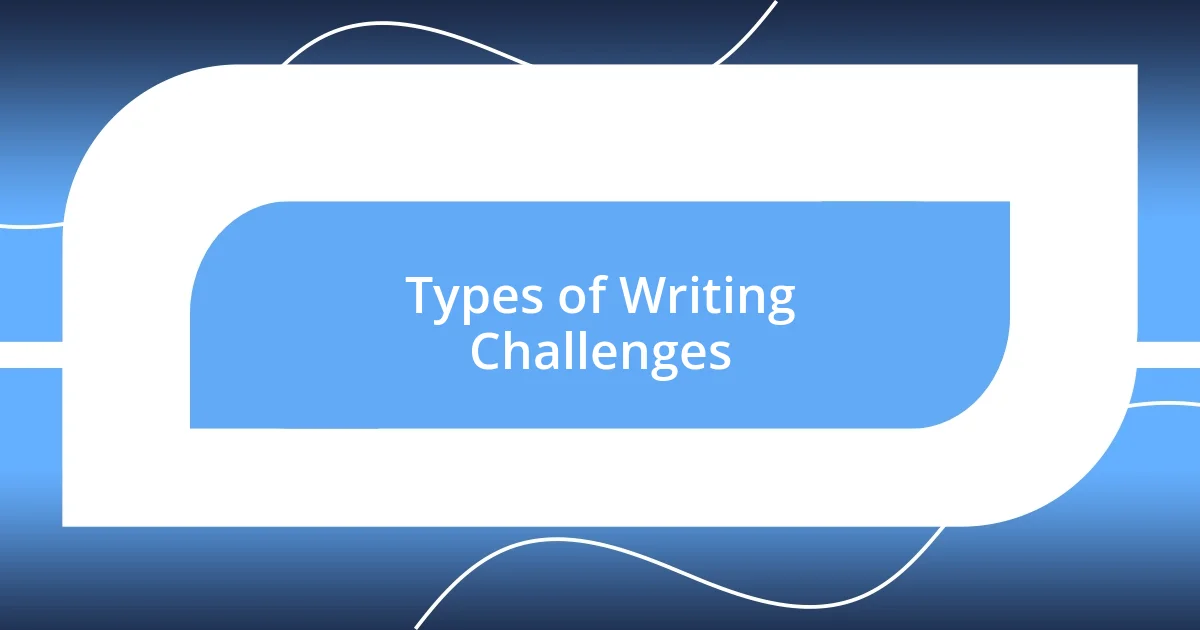
Types of Writing Challenges
Writing challenges come in various forms, each offering unique lessons. For instance, a word count challenge prompts a writer to stretch their creativity and productivity, while a prompt-based challenge pushes you to generate ideas outside your comfort zone. I remember a time during a prompt-based challenge when I had to write a story from the perspective of an inanimate object. It forced me to tap into my imagination in ways I’d never considered before.
Another type worth mentioning is the collaborative writing challenge. These often require teams to create a story together, blending different styles and voices. I participated in one of these challenges once, and I found it both exhilarating and humbling. It’s incredible how sharing the responsibility of storytelling can lead to a richer narrative, as unexpected twists emerge from different perspectives. I often wonder how collaboration can enhance our individual writing styles and push us to think outside our usual frameworks.
Finally, there are endurance challenges, like NaNoWriMo, which encourage us to produce an entire manuscript in a month. They can be overwhelming, yet they foster a sense of community. During my first NaNoWriMo, I was surrounded by fellow writers who shared their struggles and triumphs, which was a powerful motivator. It reminded me that writing doesn’t have to be a solitary journey; the camaraderie can be just as enriching as the writing itself.
| Type of Challenge | Description |
|---|---|
| Word Count Challenge | Focuses on increasing writing output over a set time. |
| Prompt-Based Challenge | Encourages creativity by using specific themes or prompts to inspire writing. |
| Collaborative Writing Challenge | Involves multiple writers contributing to a single narrative. |
| Endurance Challenge (e.g., NaNoWriMo) | Aims for the completion of a manuscript within a short time frame. |
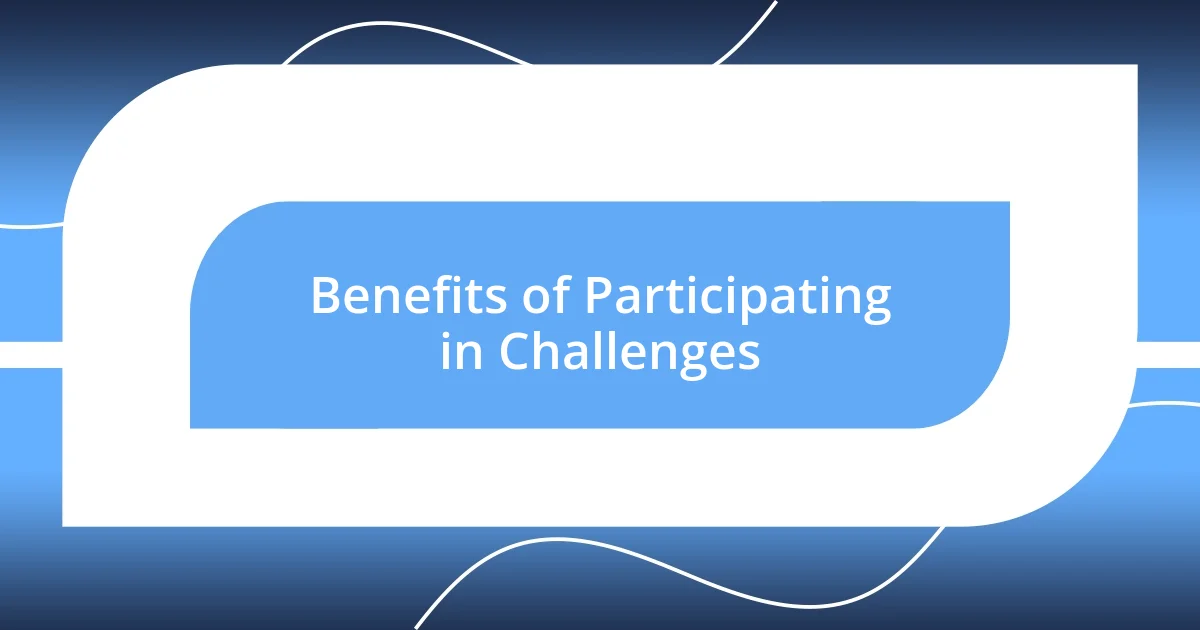
Benefits of Participating in Challenges
Participating in writing challenges has opened my eyes to the immense benefits they offer. For me, one of the most striking advantages is the boost in creativity that often comes from working under pressure. I can still recall the adrenaline rush when I started a flash fiction challenge, where I had to craft a compelling story in just 500 words. The tight limit forced me to make every word count, leading to ideas that flowed effortlessly from my mind. That experience was a turning point, igniting a new level of creative thinking that I carry into my everyday writing.
- Enhanced creativity through time constraints
- Development of discipline and sticking to deadlines
- Strengthened problem-solving skills by overcoming challenges
- Opportunities for feedback and collaboration with fellow writers
- Boost in confidence as you complete challenges and improve your craft
Another significant benefit I’ve experienced is personal growth. Each challenge has tested my resolve, pushing me to confront my fears and self-doubt. There was a time during a poetry challenge when I shared my work publicly for the first time, and the vulnerability I felt was overwhelming. Yet, the positive response from the community filled me with encouragement and showed me the power of sharing our authentic selves. It’s amazing how stepping out of our comfort zone can lead to profound connections and a sense of belonging among fellow writers. This communal experience has enriched my journey, reminding me that we are not alone in our struggles or triumphs.

Techniques for Overcoming Writer’s Block
When I find myself staring at a blank page, one technique that never fails me is changing my environment. I often head to a cozy café or a quiet park. The new backdrop sparks fresh ideas and makes words flow more freely. It’s fascinating how a simple shift in surroundings can alter our mindset, isn’t it?
I also love using freewriting as a tool to push through blocks. I set a timer for ten minutes and write without any self-editing or judgment. During one particularly tough week, this practice became a lifeline. I remember spilling out thoughts, frustrations, and ideas that I didn’t even realize I had. By the end, I discovered hidden gems I could refine into actual content. Have you ever tried this approach? It’s liberating!
Another strategy that works wonders for me is incorporating daily writing rituals. I often start my day with a cup of coffee and a quick journaling session. This simple act grounds me and provides a gentle cue for my brain that it’s time to write. When I established this routine, I noticed a dramatic decrease in my writer’s block – it’s like my mind learned to switch gears on cue. It makes me wonder how powerful our habits can be, don’t you think?
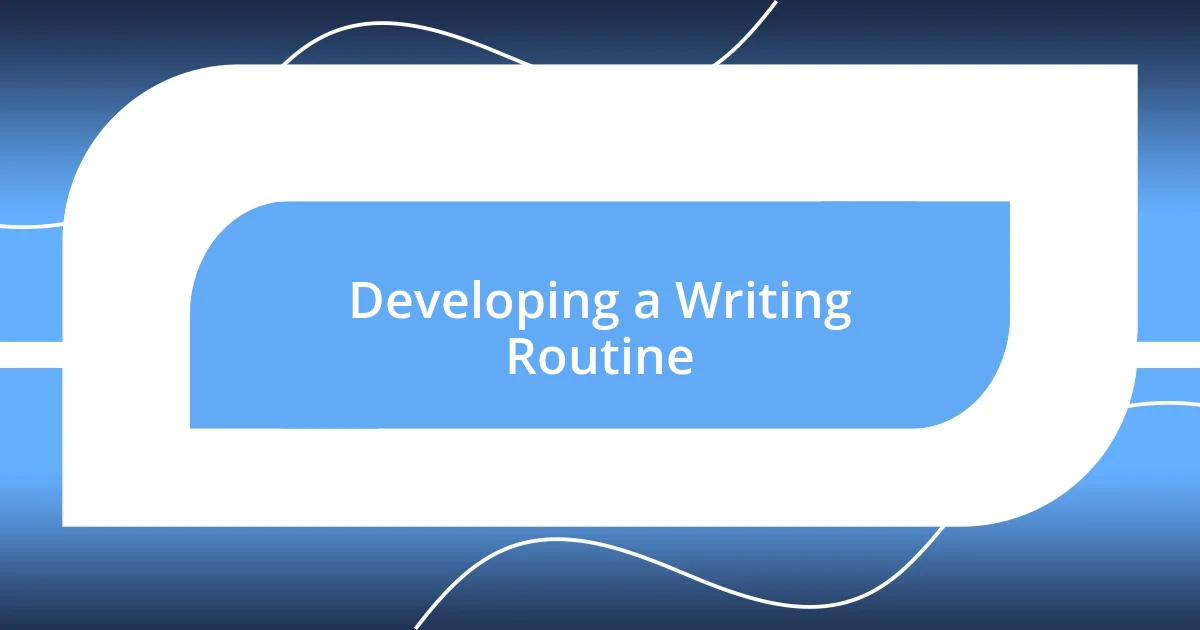
Developing a Writing Routine
Creating a writing routine has been a game changer for me. I remember when I decided to set aside the first hour of my morning just for writing. It was like uncovering a hidden treasure; my thoughts flowed unencumbered, and this quiet time became a sacred part of my day. Has anyone else noticed how clarity comes when distractions are minimized?
As I’ve refined my routine, I’ve started to associate specific activities with my writing time. For instance, I always light a scented candle to signal that it’s time to get in the zone. This little ritual transforms the atmosphere and makes me feel more focused and inspired. It’s funny how these small acts can create a powerful mental trigger to ignite creativity, don’t you think?
Building a routine isn’t just about consistency; it’s also about personal growth. When I began writing daily, I felt a shift in my self-discipline. There were times it felt tough to stay committed, especially on days when life got hectic. Yet, overcoming those days made the victories even sweeter. I learned to celebrate each small achievement, which fueled my desire to keep writing and improving.

Sharing Your Work and Feedback
Sharing my work has been both exhilarating and nerve-wracking. I remember the first time I plucked up the courage to share a piece at a local writers’ group. The anticipation was palpable, and as I read aloud, I could feel my heart racing. When the feedback came, though, it transformed that anxiety into a sense of community. The supportive comments and constructive critiques opened my eyes to perspectives I hadn’t considered. It’s amazing how feedback can enrich your writing in ways you didn’t expect, isn’t it?
I’ve also learned that feedback should not just be viewed as criticism but as a tool for growth. For instance, after sharing a story that was really close to my heart, I received mixed reviews. Initially, I was disheartened, but then I realized that the differing opinions pointed out areas where I could delve deeper. This insight pushed me to explore emotional layers and character development I hadn’t previously thought necessary. Have you ever experienced a moment where feedback shifted your entire viewpoint?
As I continued to share more of my work, I adopted a mindset that welcomed feedback with open arms. I made it a practice to specifically ask for critiques on areas I felt uncertain about. It felt almost like inviting a trusted friend to peer into my thoughts and say, “Hey, what’s working for you?” This approach not only helped refine my writing but also fostered deeper connections with fellow writers who felt encouraged to share their honest thoughts. In hindsight, I realize that sharing and receiving feedback isn’t just about improving a piece of writing; it’s about nurturing our creative journeys together.
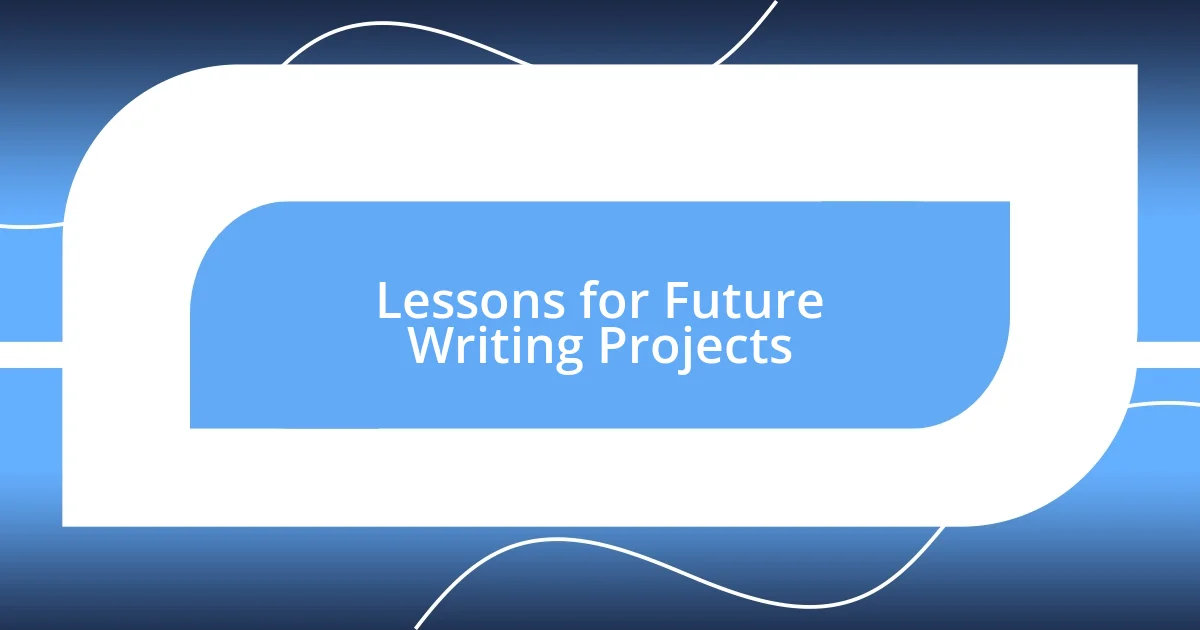
Lessons for Future Writing Projects
The importance of setting clear goals cannot be overstated. I remember when I tackled a month-long writing challenge with the goal of completing a short story. At first, I felt overwhelmed, unsure of where to start. Then I broke it down into bite-sized tasks, such as character sketches and plot outlines. This approach not only made the project manageable but also fueled my motivation as I checked off each small accomplishment. Isn’t it amazing how clarity in our objectives can shift our mindset and make the impossible feel attainable?
Another key lesson I learned is the value of staying open to inspiration. There were times when I hit a creative wall, feeling stuck and unmotivated. In those moments, I took to journaling my thoughts, not just about writing but about life’s little intricacies. These reflections often sparked ideas that were previously hidden. Through this experience, I realized that inspiration can come from the most unexpected places. Have you ever found a story idea while simply watching the world around you?
Lastly, I discovered that celebrating progress, no matter how small, cultivates resilience. After completing a draft, I made it a point to treat myself—sometimes with a favorite dessert or a few hours of guilt-free TV time. This habit fostered a positive mindset, reminding me that writing is as much about the journey as it is about the destination. Each tiny victory became a stepping stone, reinforcing my love for the craft. How do you celebrate your writing milestones?



